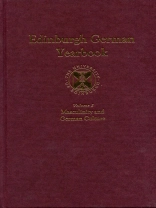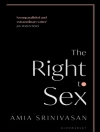Volume focusing on a multitude of incarnations and meanings of ‘masculinity’ in German culture from medieval times to the present.
Intended to encourage and disseminate lively and open discussion of themes pertinent to German Studies, viewed from all angles — literary, artistic, musical, theoretical —
Edinburgh German Yearbook takes particular interest in cultural problems and issues arising out of politics and history. Each year,
EGYB invites scholarly contributions on a topic of current challenge to German Studies. No other yearbook covers the entire field of German Studies while addressing a focused theme in each issue; by doing so,
EGYB aims to encourage real debate around the issues at hand. Volume 2 examines the meanings and significance of ‘masculinity’ in German culture, from medieval mystics to the cultural impact of young male immigrants living in Germany today. Other topics include medieval masculinity, the heroic Germanic ideal in the 16th and 17th centuries, masculinity in fairy tales, Jewishness andthe masculine, toys for boys in Wilhelmine Germany, the science of sexology, and the masculine as it appears in photography, fashion, army magazines, terrorism, and prison culture.
Contributors: Peter Davies, Cordula Politis, Theresia Heimerl, Franziska Ziep, Helen Watanabe-O’Kelly, Hanne Boenisch, Antje Roeben, Laura Martin, Kristiane Gerhardt, Michael Gratzke, Martin Lücke, Stephanie Catani, Bryan Ganaway, Jason Lieblang, David James Prickett, Katie Sutton, Elisabeth Krimmer, Franz Bokel, Andrew Bickford, Ingrid Sharp, Clare Bielby, Sarah Colvin, Elke Gilson, Frauke Matthes.
Sarah Colvin is Professor and Eudo C. Mason Chair of German, and Peter Davies is Senior Lecturer in German, both at the University of Edinburgh.
Tabela de Conteúdo
Introduction: ‘Crisis’ or ‘Hegemony’? Approaches to Masculinity – Peter Davies
Nach der mannesnamen site? Amazons and Their Challenge to Normative Masculinity in Herbot von Fritzlar’s
liet von Troye – Dr. Cordula Politis
Konzepte männlicher Identität in der deutschen Mystik des Mittelalters am Beispiel von Meister Eckhart und Heinrich Seuse – Theresia Heimerl
Männlichkeit ex negativo: Unsichere Romanhelden des 18. Jahrhunderts – Antje Roeben
‘Das Opfer war Gebot, war Leidenschaft’: Männlichkeit und Heldentum in Fontanes
Wanderungen durch die Mark Brandenburg – Michael Gratzke
Im Labor des Prometheus: Polare und integrative Männlichkeitskonstruktionen in der Sexualwissenschaft um 1900 – Martin Lücke
Consuming Masculinity: Toys and Boys in Wilhelmine Germany – Bryan Ganaway
Double Exposure: Photography, Hegemony, and Masculinity in Wilhelmine and Weimar Germany – David James Prickett
From Dandies to
Naturburschen: The Gendering of Men’s Fashions in Weimar Germany – Katie Sutton
Kultur in der Krise: Zur Konstruktion von Männlichkeit bei Alfred Döblin und Robert Musil – Stephanie Catani
A New Kind of Woman: The Feminization of the Soldier Works by Remarque, Jünger, and Böll – Elisabeth Krimmer
Moving Men: Women’s Discursive Engagements with the 1930s and 1940s – Franz Bokel
Representations of Male Inadequacy in the
Geschlechtertausch Stories of the German Democratic Republic – Ingrid E. Sharp
Revolutionary Men and the Feminine Grotesque in the West German Media of the 1960s and 1970s – Clare Bielby
Masculinity, Madness, and Religion: The Patriarchal Legacy of the Bible in Sibylle Lewitscharoff’s
Pong – Elke Gilson
Of
Kanaken and
Gottes Krieger: Religion and Sexuality among Feridun Zaimoglu’s Young Muslim Men – Frauke Matthes
Abziehen oder Abacken? Young Men in German Prisons: Fiction and Reality – Sarah Colvin
Sobre o autor
FRAUKE MATTHES is a Lecturer in German at the University of Edinburgh.












